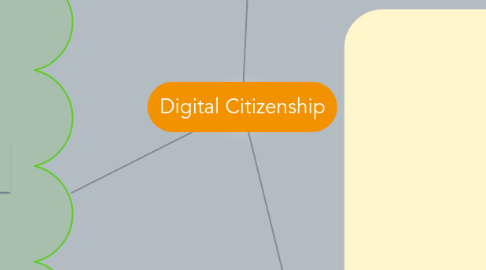
1. The Issues
1.1. Respect intellectual property
1.1.1. Copyright
1.1.1.1. Copying and pasting
1.1.1.2. Includes public domain and trademark
1.1.1.3. No credit given
1.1.2. Fair use
1.1.2.1. Copying must be "transformative"
1.1.3. Creative Commons
1.1.3.1. Awareness of user rights
1.2. Respect oneself
1.2.1. Privacy and Security
1.2.1.1. Lack of knowledge about privacy settings
1.2.1.2. Possibility of data translating to maps
1.2.1.3. Inability to control what is shared online
1.2.2. Responsibility with freedom
1.2.2.1. Misuse of anonymity
1.2.2.2. Excessive internet use
1.2.2.3. Gambling
1.2.3. Health and well-being
1.2.3.1. Misrepresentations of body image
1.2.3.2. Misrepresentations of gender
1.2.3.3. Representations of violence
1.2.3.4. Pornography/sexting/sexual exploitation
1.2.4. Communicate effectively
1.2.4.1. High risk of miscommunication or misconception
1.3. Respect others
1.3.1. Etiquette and Ethical behaviour
1.3.1.1. Flaming and Flame Wars
1.3.1.2. Trolls
1.3.2. Permission
1.3.2.1. Posting about others only after you have asked them first
1.3.3. Cyberbullying
1.3.3.1. Online Hate
1.3.3.2. Unauthorized sharing of photos/information
1.4. Authenticity/Trustworthiness
1.4.1. Author qualification
1.4.2. Relevancy of information
1.4.3. Presence of bias or opinion
1.4.4. Accuracy
1.4.5. Currency
1.5. Marketing
1.5.1. Promotes Consummerism
1.5.2. Utilizes "pester power"
1.5.3. Utilizes child psychology
1.5.4. Promotes brand recognition
1.5.5. "Buzz marketing"
1.5.6. Infiltrates school environments
1.5.7. Gears adult entertainment towards children
2. The Positives
2.1. Communication
2.1.1. Social media sites
2.1.2. Email
2.1.3. Programs facilitating group work (Ex: Google docs)
2.2. Literacy
2.2.1. Uses/Benefits of technology
2.3. Access
2.3.1. Where to find inforation
2.3.2. How to find information
2.4. Student & Teacher awareness
2.4.1. Gaming, analogies, student generated projects, investigative role-playing etc
2.4.2. Guest speakers, third party resources, etc
2.4.3. Self-created curriculum, department citizenship program, school-wide program, etc
3. Resources
3.1. Building web awareness
3.1.1. Media Smarts (Website)
3.1.1.1. Media Issues
3.1.1.2. Digital Issues
3.1.1.3. Educational games
3.1.1.4. ETutorials
3.1.2. Common sense media (Website)
3.1.2.1. Scope and Sequence
3.1.2.2. Digital Citizenship curriculum overview K-12
3.1.2.3. Lesson Plans
3.1.3. Digital Citizenship policy development guide (online doc)
3.1.4. Cybertak (study)
3.1.5. Get Cyber safe (Website)
3.2. Cyberbullying prevention
3.2.1. Bullying.org (Website)
3.2.1.1. Presentation
3.2.1.2. Online course
3.2.1.3. Bullying awareness
3.2.1.4. Support groups
3.2.1.5. Resources
3.2.2. Prevnet (Website)
3.2.2.1. Research
3.2.2.2. Resources
3.2.2.3. Projects
3.3. Clarifying key issues for students
3.3.1. Good pictures Bad pictures (Book)
3.3.1.1. Healthy and unhealthy sexuality
3.3.1.2. Dangers of pornography
3.3.1.3. How to reject pornography
3.3.2. New media design (Website)
3.3.2.1. Copyright awareness
3.3.2.2. preventative measures
3.3.2.3. Citation
3.4. Teacher resources
3.4.1. Webquest.org (Website)
3.4.1.1. K-12 applications
3.4.1.2. inquiry based
3.4.1.3. challenges students to explore the internet properly and effectively
